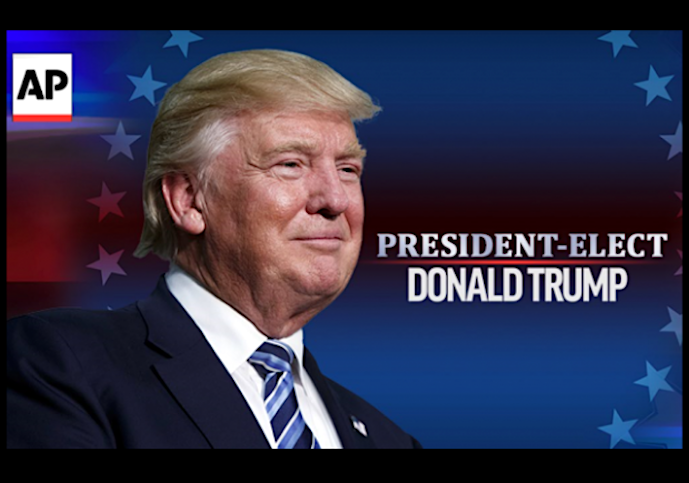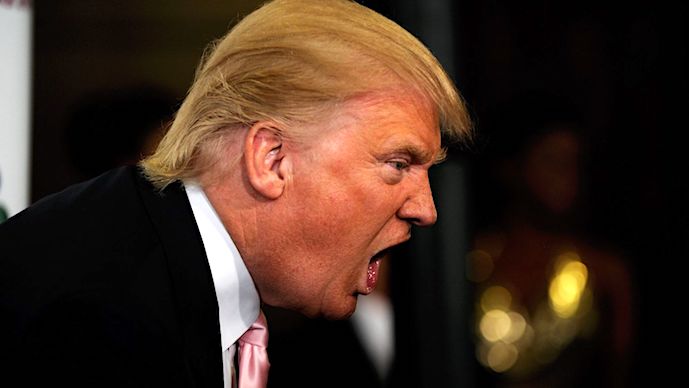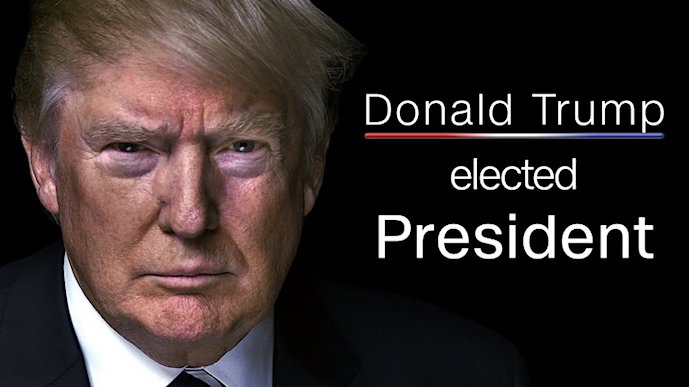-
23/11/2016
-
Ad astra
-
analysis

Way back in 1927 German physicist Werner Heisenberg described the
Uncertainty Principle that applies to quantum mechanics. It states that the more precisely the position of a particle is determined, the less precisely its momentum can be known, and vice versa. With apologies to Heisenberg and quantum physicists, the uncertainty principle seems to be a suitable metaphor for America’s President Elect.
Of all the nouns that could now be applied to the name ‘Donald Trump’, ‘uncertainty’ is the most plausible. Is there anyone who is prepared to make predictions with certainty about what Trump’s contribution to American and world politics might be?
Read these synonyms of ‘uncertainty’: unpredictability, unreliability, riskiness, chanciness, precariousness, unsureness, changeability, inconsistency, fickleness, hesitancy, doubt, vacillation, equivocation, vagueness, ambivalence, disquiet, wariness, chariness, skepticism, doubt, misgiving, apprehension, quandary, dilemma, reservation, query, and suspicion.
Read these antonyms: certainty, predictability, and confidence.
Are there any synonyms that do not apply to Trump?
In the June issue of
The Atlantic, long before the presidential election, Dan P. McAdams, professor of psychology and the director of the Foley Center for the Study of Lives at Northwestern University, wrote
The Mind of Donald Trump, a detailed appraisal of the psychological traits that govern Trump’s behaviour. It’s a long article that is well worth the time it takes to read it.
McAdams based his analysis of Trump on the five basic dimensions of human variability, which are pretty stable across a person’s lifetime (Trump is 70):
Extroversion: gregariousness, social dominance, enthusiasm, reward-seeking behavior
Neuroticism: anxiety, emotional instability, depressive tendencies, negative emotions
Conscientiousness: industriousness, discipline, rule abidance, organization
Agreeableness: warmth, care for others, altruism, compassion, modesty
Openness: curiosity, unconventionality, imagination, receptivity to new ideas.
Who would disagree that Trump exhibits hyper-extroversion and hypo-agreeableness? He seems to be low on neuroticism, but on the ‘conscientiousness’ scale he is high on industriousness, yet low on discipline; his minders had to endure his ill discipline on the campaign trail and on social media. His ‘openness’ is questionable. He is unconventional, but who is willing to predict his willingness to embrace new ideas?
McAdam analysed Trump’s traits in detail:
“Across his lifetime, Donald Trump has exhibited a trait profile that you would not expect of a U.S. president: sky-high extroversion combined with off-the-chart low agreeableness…
“A cardinal feature of high extroversion is relentless reward-seeking. Prompted by the activity of dopamine circuits in the brain, highly extroverted actors are driven to pursue positive emotional experiences, whether they come in the form of social approval, fame, or wealth. Indeed, it is the pursuit itself, more so even than the actual attainment of the goal, that extroverts find so gratifying. When Barbara Walters asked Trump in 1987 whether he would like to be appointed president of the United States, rather than having to run for the job, Trump said no: “It’s the hunt that I believe I love.”
McAdams asked his readers to: “Imagine Donald Trump in the White House. What kind of decision maker might he be?”
He concedes that it is very difficult to predict the actions a president will take:
"Research suggests that extroverts tend to take high-stakes risks and that people with low levels of openness rarely question their deepest convictions. Entering office with high levels of extroversion and very low openness, George W. Bush was predisposed to make bold decisions aimed at achieving big rewards, and to make them with the assurance that he could not be wrong…
“Like Bush, a President Trump might try to swing for the fences in an effort to deliver big payoffs – to make America great again, as his campaign slogan says.
“As a real-estate developer, he has certainly taken big risks, although he has become a more conservative businessman following setbacks in the 1990s. As a result of the risks he has taken, Trump can (and does) point to luxurious urban towers, lavish golf courses, and a personal fortune that is, by some estimates, in the billions, all of which clearly bring him big psychic rewards. Risky decisions have also resulted in four Chapter 11 business bankruptcies involving some of his casinos and resorts.
“Because he is not burdened with Bush’s low level of openness, Trump may be a more flexible and pragmatic decision maker, more like Bill Clinton than Bush: He may look longer and harder than Bush did before he leaps. And because he is viewed as markedly less ideological than most presidential candidates (political observers note that on some issues he seems conservative, on others liberal, and on still others non-classifiable), Trump may be able to switch positions easily, leaving room to maneuver in negotiations with Congress and foreign leaders.
“But on balance, he’s unlikely to shy away from risky decisions that, should they work out, could burnish his legacy and provide him an emotional payoff.”
It has been observed that Trump reads little. He relies on his gut feelings when assessing risks, even when the stakes are high.
In his article McAdams relates a story about Trump negotiating the purchase of an estate in Scotland to convert the dunes and grassland into a luxury golf resort. “
The estate’s owner, Tom Griffin, recalls that Trump was a hard-nosed negotiator, reluctant to give in on even the tiniest details, but as Michael D’Antonio wrote in his recent biography of Trump, ‘Never Enough’, Griffin’s most vivid recollection of the evening pertains to the theatrics. It was as if the golden-haired guest sitting across the table were an actor playing a part on the London stage. “It was Donald Trump playing Donald Trump,” Griffin observed. There was something unreal about it.”
Donald Trump is an actor. He is a TV reality show star. He is accomplished at acting. A week after his election he has already retreated on several policy issues that were key to his success. It looks now as if Trump’s election rhetoric was an act to attract votes from the audience that he perceived would support him strongly: working, white middle class males resentful at having lost their jobs to overseas countries because of globalization and technology.
Let’s look at what’s become of some of his pre-election rhetoric.
The Mexican wall now might be made up in part by fences. There’s been no more talk of Mexico footing the bill.
The threat to deport some three million illegal Mexican immigrants is no longer a certainty, as it was pre-election. Who can guess how that threat will play out?
It seems now that ‘Obamacare’ will no longer be discontinued and replaced by Trump’s ‘superior scheme’. How much of it will survive? Will another scheme even be offered?
NATO now seems to be back in favour with Trump, and the nuclear threat that embellished his rhetoric has been toned down.
After Trump met Barack Obama, whom he had denounced repeatedly, he began to talk about seeking his counsel. His condemnation of Crooked Hillary and the criminal Clinton family has turned into words of admiration for what the Clintons have contributed, and there’s even talk of Trump seeking their advice. The threat of criminal prosecution and gaol for Hillary has evaporated, at least for now. Trump’s acerbic comments about several of his Republican rivals and colleagues have lost much of their acidity.
Already, predictions of what President Trump might do are proving problematic. Writing in the November 12-13 issue of
The Weekend Australian, Paul Kelly warns:
Beware of confident predictions about what Trumpism means once the man sits in the Oval Office. This is a classic Donald Rumsfield’s notion of ‘known unknowns’ – things we know we don’t know. The smartest people in the world are clueless about how Trump will govern or what he will actually do.”
Given that Trump is a consummate actor who can be whatever Trump he wants to be at any time, who can change like a chameleon from one policy position to the converse, how finely tuned are his political skills?
He certainly tapped into the prevailing anger and resentment of unemployed white males in the rust belt. Although it was a close election (Clinton won the popular vote), Trump captured 60% of the white male vote with his promises to fix their problems.
Paul Kelly wrote: “
He has mobilized a new force in the country…the key was Trump's cunning in diagnosing the ‘personal grievances’ plaguing the American soul. Trump became a symbol – the fixer, the nostalgic agent, the man who shared your anger, and he depicted a political establishment rotten to the core. His victory revealed an America even more politically divided than we grasped, with its sense of moral compass smashed to pieces.”
So far Trump gets high marks in political acumen on the domestic front for winning what the pundits and polls said was unwinnable for him. But how will he fare on the international front? Nobody knows.
Kelly’s assessment is:
"Trump’s brazen capacity to impose parts of his agenda and ditch others should not be misjudged. Remember, Trump doesn’t play by the rulebook; he just tore it up and got rewarded.
“This is a time for calm and rationality. Anger at Trump’s election is as worthless as denouncing the American public. It is as true today as it was before to say Trump is unfit to be president. But it is counter productive because he is president. History keeps remaking our realities. And Trump, inexperienced in public life, must figure out how to keep remaking himself.
“If you believe that Trump’s agenda is a danger to the world – pretty much a statement of the obvious – then the only rational response is to engage, advocate and persuade.” This is how political leaders around the world should act…
“In truth, Trump is about to enter a steep learning curve. He will be more prepared to listen to friends and supporters, not patronizing leaders who think criticizing Trump will earn them electoral kudos at home. Trump, no doubt, will treat such leaders as mugs. You don’t need a doctorate in psychology to realize Trump is a vain man with a glass jaw likely to visit retribution on leaders and countries that opt for gratuitous insults. [He is said to keep count of insults and slights and extract revenge later.]
“The most fascinating element in Trump, however, is his dual identity. There seems to be two Donald Trumps, thereby complicating how the new president will govern: the real Trump and candidate Trump.”
What motivates Trump?
Winning, success, admiration, praise and wealth top the list.
According to Barack Obama, Trump is pragmatic rather than ideological. Judging from his pre-election pronouncements, he seems not to have fixed policy positions, nor does he have many. In that case he might not find the ideologies of the conservatives and their hard right colleagues in the Tea Party attractive enough to underpin his policies when he gets round to formulating them.
Obama has reassured us that Trump is committed to America’s four international alliances, of which NATO is the most important. Former US ambassador to Australia, John Berry, in an interview on
Lateline, indicated that Trump would likely honour the deal to take refugees from Nauru and Manus Island as the US alliance with Australia was so strong; Australia is “
a great friend and great ally”. The ABC reported that Australia was Trump’s ‘poster boy’! Less reassuring is the talk of the US amassing a fleet to challenge China’s incursion into the South China Sea.
Trump’s commitment to the UN Climate Change initiative is more problematic. He regards all the talk of global warming as a hoax,
”created by and for the Chinese in order to make US manufacturing non-competitive”, and has threatened to cut US funding for the UN initiative. Should he do so, the UN efforts to restrict global warming to 1.5 degrees above pre-industrial levels would be severely frustrated. Chaos in the environmental arena would result. We can only hope his advisors will persuade him not to go down that dangerous track, and instead focus on renewable energy rather than his beloved fossil fuels.
Another contentious policy area is free trade. Trump is isolationist, and threatens to put up trade barriers in the form of high tariffs on imported goods, especially those from China. The Trans Pacific Partnership, which has only lukewarm support in America, seems doomed already.
On the economic front he talks as if he is a latter-day Ronald Reagan, intent on giving massive tax cuts – from 35% down to 15% – a move that would cut federal revenues by an estimated $9.5 trillion over a decade. He lauds Reaganomics, based as it was on trickle down economics, but as Saul Eslake points out, he ignores the fact that during Reagan’s presidency “
the US Federal Reserve cut rates from 17.5 to 6 per cent, and the US debt-to-GDP ratio rose from 20 to 40 per cent.” Trumponomics will do no more to benefit the unemployed and lower income workers than any other iteration of trickle down economics has. His stated intention though to build massive infrastructure might.
Writing in
The Weekend Australian about Trump, John Durie noted: “
The magic wand is missing, as is some magic potion. No wonder, when asked, Australia’s financial regulators were unanimous in their warning that ‘it’s too early to tell what Trump will do’ ”
All the above leaves aside the fact that the US President Elect has many personal defects. To paraphrase what I wrote in
Trump is just part of the problem:
"We can see from his words and actions that on the personal front he is an ugly misogynist and a womanizer, yet is disrespectful of so many of the women who have entered his ambit, women whom he regards as his property, to do with as he wishes. He labels as liars the continuing procession of women who have accused him of sexual predation, insisting that all these claims have been ‘proven false’, and that he will sue them after the election.

“We know too that he is a bully, and has a nasty streak that shows when he calls his opponent ‘Crooked Hillary’…labels her a ‘criminal’... calls her a liar, accuses her of ‘having tremendous hate in her heart’, attacks her over her husband’s alleged womanizing, and suggests she should be drug tested before their debates.”
It’s curious that these obnoxious attributes have attracted little comment since the election; commentators are now so concerned about the domestic and global consequences of a Trump presidency that they have faded into the background. Womanizing is one thing, but the prospect that he will propel the US and the world into chaos and conflict is what Trump observers are petrified about.
’Uncertainty’ makes for anxiety, apprehension, and fear. World and national leaders are afflicted, as are international bodies, defence analysts, economists, international and national bankers, business and industry bodies, unions, refugee agencies, advocates for women, pro-choice advocates, immigration and multicultural activists, and countless men, women and even children who are now even more uncertain about the future, the future of their nation, the future of the globe as it faces multiple challenges which world leaders seem unable to manage. To add to their anguish, they now have the burden of having to deal with a loose cannon leading the most powerful nation on earth. Understandably, uncertainty and fear are the prevailing emotions.
So much depends on those with whom Trump surrounds himself, and those to whom he listens.
Isn’t is astonishing that just one man has created this extraordinary global upheaval!

Current rating: 0.4 / 5 | Rated 14 times